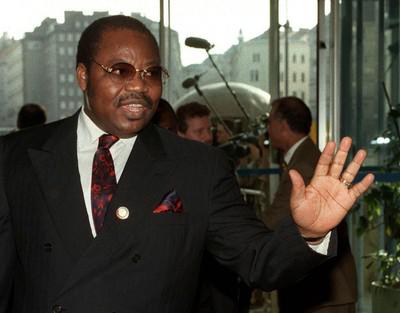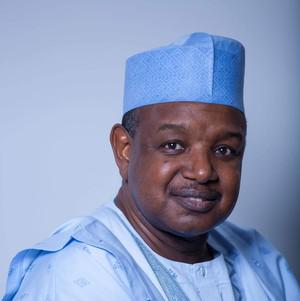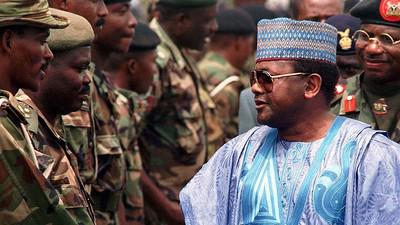In the 1990s, energy company executives bribed Nigerian officials to get lucrative oil licenses. During the investigation “Secrets Credit SuisseIt emerged that the company’s parent firm was transferring money to Swiss bank accounts jointly owned by its employees and African elites, including the head of Nigerian intelligence.
Below is a summary and overview of the main findings of the investigation. Read the main version in English here.
Four AOG Investment Fund Employees Share Credit Suisse Accounts With African Political Figures
In May 1998, little-known Addax Petroleum struck one of the most lucrative deals in the history of the Nigerian oil industry.
Addax had no experience in oil production, but it received four licenses for oil exploration and oil production. After the deal, the business of the Swiss company registered in Curacao went uphill. It was converted to a public company in 2006 and sold three years later to the Chinese state-owned oil giant for $7.2 billion.
Years later, a court in France unearthed the hidden reasons for the company’s sudden success: Addax executives testified that they had paid $5 million in bribes to the Swiss bank account of Dana Etete, Nigeria’s oil minister during the military dictatorship of Gen. Sleigh Abachi.

The payments helped the company obtain oil licenses from US-based Ashland Inc., which was at odds with Nigerian authorities. During the investigation, it turned out that Addax also opened accounts in Switzerland for the two eldest sons of Abacha and transferred illegal “commissions” to Nigerian officials through Swiss banks.
Among others, Umaru Ali Shinkafi, the former head of Nigerian intelligence, received money – his connections with Addax were not previously reported. By 2015, Shinkafi also owned a substantial stake in AOG, according to a shareholder register obtained by OCCRP. In 2016 he died. His family did not respond to requests for comment.
Eleven people were listed as the owners of the five Credit Suisse accounts, including four AOG employees and various politicians from West and Central Africa. OCCRP has identified the following account holders:
Mustapha Niasse, former Minister of Foreign Affairs of Senegal, served as President of the National Assembly from 2012 to 2022. Niasse stated that he was not aware of these accounts. But he said he co-founded AOG in 1987 and left the company in 2006 when Addax listed on the Toronto Stock Exchange;
Maurice Nguesso, elder brother of the President of the Republic of the Congo. He did not respond to requests for comment;
Dominique Nimi Madingu, Congolese politician. Madingu died last year;
Umaru Ali Shinkafi, former Nigerian intelligence chief and presidential candidate. His son-in-law Atiku Bagudu laundered money for Sani Abacha;
Ahmed Kusamotu, an old associate of Shinkafi. In the early 1990s, he headed a political party;
Abdoulaye Diao, a wealthy Senegalese oil trader, maintains close ties to the country’s leadership. His son, Moussa Diao, leads Oryx Energies, a subsidiary of AOG;
Lourenço de Almeida, until 2009 he was a trading manager at AOG;
Ali Keve Ndiaye, was a trader at AOG until 2009;
Mamadou Siss, until 2006 he was the senior vice president of AOG;
Franklin Jackson, AOG employee.
The first joint account, owned by 11 persons, was opened in 1994, the year Addax Petroleum was founded. In 2005, when Addax was registered in Canada and the company paid tens of thousands of dollars in publicly declared dividends for the first time, the account amounted to 62 million Swiss francs ($53.32 million).
The following year, shortly after Addax floated on the Toronto Stock Exchange, the same eleven people jointly opened four new accounts with Credit Suisse.
AOG acknowledged the existence of these accounts, but said they were “not secret, these accounts were opened, owned and operated by AOG group companies and used for normal business purposes,” including dividend payments or share buybacks.
According to the company, the individuals named in the accounts became shareholders of AOG for “modest amounts”, either through an employee and director incentive program, or received shares at par value during the first round of raising funds. At that time, “none of them had a political mandate,” the company said.
According to the expert, in order to pay dividends, such complex schemes are not needed, and it is difficult to imagine for what legitimate purpose AOG could hold joint accounts with high-ranking politicians.

According to the US Department of Justice, Shinkafi’s son-in-law, Atiku Bagudu, laundered money for Sani Abacha. Bagudu is currently governor of Kebbi state in northeastern Nigeria.
Zainab, Bagudu’s second wife and Shinkafi’s daughter, did not respond to requests for comment.
In 1999, Shinkafi ran for vice president while maintaining accounts at Credit Suisse. At the same time, he acquired shares in AOG. In 2015, the year before Shinkafi’s death, Shinkafi owned 500 Class A shares, according to a shareholder register obtained by OCCRP.
At AOG, OCCRP staff were told that Shinkafi was one of the original minority shareholders, but he never owned more than 0.27 percent of the company’s shares. According to representatives of the AOG, they did not know about his political activities and ties with Abacha.
Kommersant.Ru, 07.12.2017, “Switzerland returns the money stolen by the dictator”: On Wednesday, the Nigerian Civil Society Development Council, made up of nine civil rights and freedoms NGOs, issued a statement welcoming the imminent return from Switzerland of millions of assets stolen by former dictator Sani Abacha. […] We are talking about a tripartite agreement signed the day before between the governments of Nigeria, Switzerland and the World Bank on the restitution of $321 million. Switzerland froze these funds on the accounts of members of the family of the former dictator in accordance with a special procedure provided by the Geneva prosecutor, who is conducting a case on the search for and return of funds stolen from countries during the reign of Sani Abacha. The total amount of funds stolen and taken out of the country is estimated at about $4 billion. […] In 2012, the police announced the discovery of the jewelry of the Abacha family for about $ 120 thousand. Earlier, Switzerland had already returned to Nigeria $ 700 million in funds seized on the accounts of members of the Abacha family.
In the 1980-90s, Sani Abacha, a regular military man, took part in several coup d’état, and in 1993-98 he became the de facto ruler of the country. […] In 1998, Sani Abacha died suddenly at the age of 54, according to the official version – from a heart attack. However, the most common version is poisoning – it is reported that on the eve of his death, Mr. Abacha spent the weekend with two or three Indian prostitutes discharged for him from Dubai. One of them allegedly gave him a glass of poisoned juice. The funeral of the ruler took place on the day of death, which immediately aroused suspicions of her violent nature. — Inset K.ru
RG.ru, 02/07/2022, “Nigeria demanded that Britain return millions of General Sani Abacha”: Nigerian authorities have filed a lawsuit against the British National Crime Agency, demanding to release about 180 million euros that belonged to the former dictator of the African country, General Sani Abacha. These funds were previously frozen at the request of the US authorities, who promised to “return the money to the people of Nigeria”, but not directly, but through a special program. The Nigerian authorities are not satisfied with such a formulation of the issue – they want to get full access to money without Western intermediaries.
During the five years of his reign (1993-1998), Abacha, through his entourage and relatives, brought abroad, according to various estimates, from two to four billion dollars. For the most part, the money settled in the financial institutions of Austria, Belgium, Britain, Liechtenstein, Luxembourg, USA, Switzerland. In particular, the funds he took out were found in about two dozen British banks. […]
For Nigeria, the battle for the money withdrawn by the general abroad has become one of the foreign policy priorities. The country has achieved some success in this regard. Thus, the Nigerian government returned more than a billion dollars, taken out by Abacha and lying on dummy accounts in Swiss banks. In 2010, a court in Switzerland gave the dictator’s youngest son Abbu Abacha a suspended sentence of 24 months in prison on charges of money laundering his father, confiscating a significant amount from him. But other countries, where the money of the former dictator was found, are in no hurry to part with them, even after they recognize their illegal origin. For example, back in 2014, the United States confiscated more than $300 million that belonged to Abacha, but this money did not reach the accounts of the Nigerian government until 2020. — Inset K.ru








